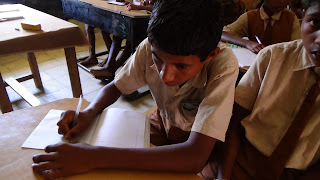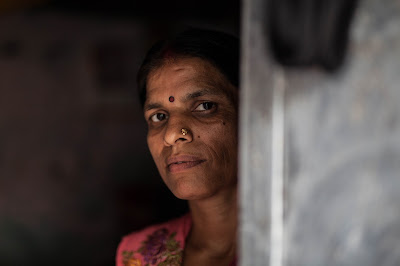19-year-old Nazmeen lives at Haiderpur in
north Delhi.
Her father migrated from Bihar in search of
better livelihood opportunities leaving his wife, Nazmeen’s mother, behind.
Nazmeen was not even born then. “This is how it happens. Initially, men marry,
leave their wives and go to the cities in search of work. They seldom return,
consumed by the attractions of a city life and unreasonable working hours,” she
explains.
After three years of her parents’ marriage, Nazmeen’s mother decided
to follow her husband to Delhi. She had three children by then. With no source
of income and little-to-no support from her husband, it became increasingly
inconvenient for her to just depend on relatives.
Her struggles followed her to Delhi where
she lived at Anand Parvat slum cluster with her children. Her husband worked as
an ice-cream vendor with little to no income. There were days when the family
of five would go without food. Yet, Nazmeen’s father would give no more than Rs
500 to support his family. The rest of his income went into alcohol and
gambling.
 |
| Nazmeen with her parents |
On a neighbour’s advice Nazmeen’s mother decided
to move to a juggi at Haiderpur with
her children. She also started working as a domestic help, earning Rs. 2,500
per month. The family was saved from starvation; but it meant that her elder
brothers had to stop going to school and take up daily wage work at
construction sites instead.
In her mother’s absence, Nazmeen’s elder
sister discontinued schooling and took up domestic responsibilities. At 17,
Nazmeen’s eldest sister got married.
“She is 30 years old now, and has four
children. She was pregnant within a year of her marriage, at 18. I could never
find out what her dreams could be. I shudder to think of life like hers,” her
voice breaks as she recalls her sister who was almost like a mother to her.
Nazmeen got a chance to go to school at the
age of six. She would see children in the neighbourhood go to school and plead
with her mother to send her to one. Following her footsteps, her younger
brother also got enrolled. “I remember both of us went to get enrolled. We were
the last ones and the school refused admission. On pleading with them, they
said one of us could get enrolled.
My brother asked me to take the seat. “I
will get enrolled in the next year, behen,” he said. I would never forget that moment. It was then that I vowed to make the
most of the opportunity I got, ” her voice struggles to remain steady.
Throughout school she worked hard, never
forgetting her brother’s sacrifice, her mother’s struggles and her resolve to
make the best out of the opportunity she alone had. She never came second in
class. “I worked hard. No one forced me to. At home, my mother and elder
brothers could only think of putting two meals together. I struggled to learn
so that I could put an end to their suffering. When my eldest brother got
married, my mother loaned Rs. 2 lakhs to build a brick-and-cement home with two
rooms. She worked harder to pay back,” she remembers.
When Nazmeen came home
with a glowing report card at the end of each year, there would be no one to
share her happiness. Her mother, worn out by financial troubles, would ‘place
her hand on her head, utter a blessing and wipe a tear from the corner of her
eyes’.
“It would leave me with a biting sense of guilt that I was not
supporting her financially. But, I would console myself by saying that a time
would come when I would support her better with better pay and working
conditions,” she explains.
 |
| Nazmeen's mother reflecting upon her daughter's journey. |
Nazmeen scored 75 percent in the tenth
standard. Her teachers were happy with her performance but she was sad. She
knew her family would not support her dream to study further. Her mother confirmed her worst fears.
“She
asked me to learn Urdu and take sewing lessons instead. She was concerned that
I did not have any skills to become a suitable bride,” Nazmeen laughs.
She was
admitted to a madrasa but couldn’t continue beyond one month. “I was simply not
interested. I pleaded with my mother to send me to school. After a lot of
fights, she permitted me to study for two more years. I was relieved,” she
says.
Nazmeen paid her school fees from a scholarship
she had won for her academic achievements in the tenth standard. “I came first
in the 11th standard examination and scored 86 percent in the higher
secondary examination,” she says, a hint of pride in her voice. However, she knew
her mother would not allow her to go to college. But she wanted to make a last
desperate attempt to convince her. She requested her mother to accompany her to
the school to collect her higher secondary report card. At school, her mother
met Nazmeen’s teachers. All of them heaped praises on her daughter’s
performance and appealed to her to let Nazmeen study further. But she was not
convinced.
“My brothers supported my mother’s decision
to not allow me to go to college. They were worried that I would become “too
educated” to get any groom," she explains.
Nazmeen soon found a way to go to college.
She was aware of Rs. 6000 in her bank account from a government sponsorship
(Ladli scheme) for adolescent girls in Delhi. She got herself enrolled in an
open learning course (BA in Political Science) in Delhi University.
“No one in
my family knew about it. I wanted to study further. After coming so far, I
didn’t want to stop. I chose this course because there would be no regular
classes, just one examination in six months. I thought I could make an excuse
and give my examination,” she explains.
However, her little secret was soon out
in the open. Her family was going through a financial crisis when her mother
asked her to withdraw the money from her account. This is when she confessed that
the money was gone; she had used it to get enrolled in a college.
“My mother
was angry and upset. She stopped talking to me. I pleaded with her. I agreed to
do all housework if she would allow me to sit for the examination once in six
months” she says. After a lot of convincing, she relented.
 |
| Nazmeen studies at her house |
A year ago, another opportunity came her
way. Magic Bus’ programme had just begun in her locality. Pooja, Magic Bus’
Youth Mentor, approached her with an offer: How would she like teaching
children the importance of education through activities?
“I loved the idea of
Magic Bus. I thought I could make use of my free time and teach children. But
my mother refused to allow me to step outside. She was not comfortable with the
fact that both boys and girls would come for these sessions and I would be
wearing the Magic Bus uniform in front of the entire community,” she explains.
Pooja, however, succeeded in convincing her mother to send Nazmeen for the
sessions. But, on the first day itself, her brother told her that such freedom
is not ‘honourable’ for adolescent girls and strictly forbade her from going to
the sessions ever again. “I was a Community Youth Leader for a day”, she sighs.
Pooja never lost touch with Nazmeen. She
would often visit her and talk to her about her career plans. It was from Pooja
that Nazmeen first heard about Magic Bus’ Livelihoods Centre. Pooja convinced
her mother to send her for these classes, assuring her that she would be under
strict supervision.
Nazmeen started attending the training at
Magic Bus’ Livelihoods Centre from November 2015. She started classes on
life-skills, computer lessons, and English literacy. The staff helped her plan
her career ahead. But Nazmeen seemed to have hit a dead end. She didn’t want to
dream any further.
“I was exhausted fighting at home. I knew I
wouldn’t be allowed to do a job. I knew they were looking for a groom for me. I
shared my problems with the counsellor. I shared my dream to become a teacher
one day. She listened to me. She gave me the confidence to negotiate with my
mother again. She assured me that she would even come to my house to meet my
mother. I have never received such support from anyone in my life,” she shares.
Nothing Nazmeen said could convince her
mother to allow her to work. “She told me clearly that our neighbours would
start looking down on my brothers if I start working outside. I was
crestfallen. I thought my luck had run out,” Nazmeen says.
The next day, she
was surprised to find Magic Bus’ staff at her doorstep. The Centre Coordinator
and the Counsellor visited her house, and spoke to her mother and brothers.
“If
it hadn’t been for Mithilesh sir, Avinash sir, and Jayata ma’am, I would have
been stuck at home now. All my efforts would have gone in vain,” she says.
In December 2015, Nazmeen got her first job
with the HDFC bank for a salary of Rs. 10,000 a month. “I couldn’t believe
myself. For the first time, my mother was happier than me. She knew I could
support her financially,” she says, adding, “I don’t fault her for being
difficult with me all these years. She had never seen any better during her
youth. She was my sole confidante all this while. My father was never there for
any of us, but she was.”
 |
| Nazmeen with her Mother |
Nazmeen gives a part of her salary to her
mother and saves a small part for a teacher-training course.
“I haven’t
forgotten my dream yet. It is to be a teacher,” her voice sparkles with silent
excitement as she looks forward to her dreams with renewed vigour.






















